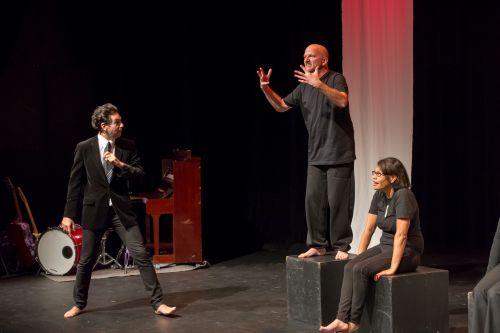At the End of my Hands: bilingual theatre tour in New Zealand
The NZSL Fund supported Equal Voices Arts by enabling the tour of the award winning bilingual theatre production ‘At The End Of My Hands’ throughout 2015 – 2016.
Equal Voices Arts were able to take the performance to Hamilton, Wellington, Auckland and Christchurch, and also offer complimentary ‘Working Through the Body’ theatre workshops in each city.
This physically bold piece of original theatre, directed by Dr Laura Haughey (University of Waikato), explored stories about Deaf culture, communication and the unique history of sign language in New Zealand. This 'beautifully staged and heartfelt' piece (Theatreview, 2015) placed both English and NZSL on stage equally, but not identically. The piece was performed with no formal interpretation between languages, and the result was a rich live experience accessible to both Deaf and hearing audiences. ‘At The End Of My Hands’ aimed to raise awareness and the profile of NZSL, Deaf culture and history, as well as sharing familiar and important stories with both Deaf and hearing audiences.
The partnership behind the theatre production won the ‘Arts Access CQ Hotels Wellington Community Partnership Award 2016’, which was presented in August 2016 in Parliament in Wellington. Here, the team was also able to perform two scenes from the show. An excerpt of the performance was also performed at the NZSL Awards at Te Papa in May 2016.
Laura Haughey explains, “We started by telling stories about communication, culture, making friends, Deaf culture and the oppression of sign languages, initially without words and signs – just using our bodies. Signs and words followed.
Round 1 external and Round 2 external support from the NZSL Fund enabled four Waikato-based Deaf actors access to professional-level theatre training and paid work opportunities. It also opened up the possibilities to explore the practice of visual vernacular, a theatre discipline new to New Zealand. By providing training to Deaf actors in New Zealand this allows the legacy of bilingual and signed theatre to be passed on to others, for Deaf, by Deaf. This project has also given rise to direct work opportunities for the Deaf actors, including more acting work and workshop delivery work. Deaf actor, Shaun Fahey went on to be involved in a second developed multilingual piece ‘Salonica’, which toured in Europe and the UK during 2017 and will tour New Zealand throughout 2017 and 2018.

The ‘Working Through The Body’ theatre workshops created the opportunity for Deaf workshop participants to access theatre training delivered in their own language and the chance to express themselves creatively in an accessible, inclusive environment. Hearing participants got the opportunity to learn from Deaf actors, demonstrating the importance of ‘Deaf Gain’; what we can learn from the Deaf actors and capitalising on the strength of the Deaf performers as physical storytellers.
The Deaf audiences have benefited from being able to access a theatre show in their own language, to share stories about Deaf culture, and to celebrate NZSL. For a number of Deaf audience members, this was their first time at the theatre, so the project enabled new experiences for some members of the Deaf community.
The hearing audiences benefitted from learning about NZSL, Deaf culture, the oppression of sign language and how important it is that we as a country respect and support NZSL use. Many hearing audience members reported back on the joy of being involved in an inclusive Q&A post show, as that forum was a rich, bicultural and bilingual space for people to share their thoughts and views about the performance and the issues it explored. Equal Voices Arts have also received many reports about the show inspiring hearing people to start to learn NZSL, thereby increasing the numbers of people who are using the language nationally. The mother of a young Deaf girl in Wellington commented in the post show Q&A, “We were inspired to learn NZSL, you’ve made us think about needing to restart lessons again”.
Throughout ‘At The End Of My Hands’, NZSL and English were presented in the piece equally but distinctly, and the stories range from comical failed seductions to sobering classroom oppression. Haughey notes that “the Deaf audience get a slightly different narrative to the hearing audience, and this is deliberate.
Most of the Deaf audience know these stories, they know sign languages worldwide were banned, they know what that oppression has done to the development of the language and cultures in the Deaf communities worldwide. For most of our hearing audience, these stories are new, and shocking. And watching alongside a Deaf audience changes their perceptions hugely.”
At the End of my Hands’ New Zealand tour gained news coverage on Prime TV: